Sportsbooks: sharp markets, high limits - and how to make a profit
Two sports traders, László Hajka and Zsolt Lázár, give a "primer" on brokers, with Hungarian context, embedded evidence and videos.
1) The concept of a broker and its place in the ecosystem
Of all the sportsbooks (sports betting platforms), I am convinced that the biggest misunderstanding among sports bettors is about brokerages (such as BetInAsia). Of course, this may be because brokerages are the hardest to make a profit at, but once you get the hang of it, you'll feel extremely lucky: You don't have to worry about being limited by the site over time if you earn a lot, because there is NO limit with brokerages, and even though it's harder to make a profit, above a certain level we're talking about money that is more than comparable to almost any investment and the profits you can make with them.
Of course, there's no fence here either, you'll need to be very disciplined, especially with bet management being key, and expect some basic assumptions that you're bound to encounter along the way. Well, that's where two sports traders, namely László Hajka and Zsolt Lázár, will help you with their "little guide", which will hopefully give you all the important information you need to know about brokerages. In case you missed something, so if there is a question you didn't get answered here, we invite you to write us on Telegram: https://t.me/fektessbeokosan, and we will expand this article. We're counting on your help, because if you have something extra, it could help others!
Sports betting brokerage - definition
Sports betting brokerage (bet broker / bet agent / brokerage): an intermediary service provider that provides access from a single account to multiple professional ("sharp") Asian bookmakers and exchanges, often with aggregated odds and limits, via its own web/fx-like trading platform or API. The broker does not offer its own odds, but transfers/shares bets between underlying providers (e.g. Pinnacle/PS3838, SBOBET, BetISN, Singbet, Maxbet, Betfair/Matchbook etc.).
Why were they created?
With "soft" European bookmakers restricting winning players, many professionals and enterprising people needed high limits (the bets they could place) and low margins. (Margin in sports betting means how much built-in profit the bookmaker has in a given market. It's the "hidden commission" really.)
Because of geo-barriers (whether a site is available in your country) and different licensing systems, direct account opening is often difficult; brokers bridge this with single-wallet solutions (so you can access 10-12 other sportsbooks on one platform).
Speed and quality of execution (one-click, top-down execution, automation, API) have become key to value-based and arbitrage strategies.
Interpretation
- Broker ≠ betting exchange (Betfair, Matchbook): the exchange is a P2P market, the broker connects several bookmakers and/or exchanges.
- Broker ≠ tipster / tip provider: the broker provides the infrastructure (account, execution), not the tip.
- Broker ≠ odds-matching/arbitrage software: these give you a signal at most; you place your bets on the broker's platform.
2) Sharp vs. Soft bookmakers - why is it harder to win at brokers?
The soft bookmakers (e.g. Bet365, TippmixPro, Bwin, Vegas, Opabet, Ivibet, Betinia, etc.) mainly target recreational players: they offer a wide range of markets, bonuses and promotions, but they work with high margins and quickly limit or ban winning players. Therefore, in soft markets, the odds may be less accurate, making it easier for a more skilful bettor to find value - although they may lose their account in a short time if they win regularly.
The sharp bookmakers (e.g. Pinnacle/PS3838, SBO, Maxbet), on the other hand, are also specifically targeting high stakes, winning players. Their margins are extremely low (around 1.5-2.5%) and they allow huge limits, but they constantly adjust the odds according to market information and the stakes of professional level bettors (investors). Because of this, the pricing (odds) for each outcome are much more accurate, the margin for error is minimal, and most players have no real edge. Hobby level strategies (e.g. "favourite team wins", "player in good form") do not work here because the price (odds) already includes all public information.
Small addition: what is edge in sports betting?
An edge means that the "real probability" (implied probability) calculated by the player is better than the odds offered by the odds.
For example, if you estimate a team's true chance of winning at 55%, but the bookmaker gives you odds of 2.10 (which is a probability of 47.6%), you have an edge: a long term plus EV bet.
If, on the other hand, the bookmaker's odds accurately reflect the probabilities, then you have no chance of a sustained profit because the odds are "fair".
What does this mean in practice?
When we say "the player has no real edge", we mean:
- your betting decisions are not based on information, modelling or analysis that is better than what the market has already priced in,
- so mathematically all bets are losers, even if they may be lucky in the short term.
Most sports bettors get access to the sharp offices available at brokerages and find that they have no lasting advantage. As these markets are the most efficient in the world, in the long run the margin (however small) will crush those who do not have an advanced statistical model, specialised information or perfect bankroll management. Therefore, most people in brokerage firms ultimately remain depositors, not profitable takers.
3) Why did brokerages only really become widespread in 2025?
Although sports betting brokerages have been around since the early 2000s, it is only in recent years that they have really started to be used by the wider betting public. On the one hand, technological advances (Mollybet, VOdds, proprietary APIs) have made it possible to offer quick and easy one-stop betting, which was previously done by phone or manual transmission. On the other hand, the limit setting practices of soft bookmakers have become more widely known, so that serious bettors have gradually turned to the sharp markets. Thirdly, the development of payment infrastructures (e-wallets, cryptocurrencies) has made international transactions much easier and faster, which used to be a major obstacle. Finally, regulatory changes (e.g. reform of Curaçao licences, tightening KYC requirements) have contributed to an increasingly transparent market and to more professional bettors turning to brokers with greater confidence. In sum, brokerages have been around for a long time, but it is in the current technological, market and regulatory environment that they have truly become central players in the sports betting ecosystem.
The Hungarian context - why are brokerages important in 2025?
The sports betting market in Hungary has developed in a unique way. In recent years, the state has gradually made it impossible for international sports betting operators, including Bet365 and other major players, to operate. These operators have, if not officially withdrawn, effectively suspended their services to Hungarian customers. As a consequence, the only option for domestic bettors is almost exclusively the TippmixPro operated by Szerencsejáték Zrt.
In the early days of TippmixPro, the limits were relatively high, with profits of up to HUF 3-5 million available on a single account (as we have shown in this video).
However, this was gradually reduced over a short period of time: first, profits were allowed up to HUF 1.7-1.8 million, and then, by the second half of 2025, the first drastic limitation would appear at HUF 500 000. From then on, the bettor could only place further bets with about 20% of his previous stakes. However, this was not enough for them, they tightened the limitation even more: we noticed yesterday that they apply a limitation of 5% or 10% right from the first limitation, so if you had bet with an average stake of say HUF 20 000, from now on your maximum bet can be between HUF 500 and HUF 2 000. This effectively eliminates the possibility for players to wager serious capital on TippmixPro.
This situation has naturally pushed many professional bettors (value bettors/investors) in two directions: either they have had to stop betting or they have turned to brokerages, which continue to provide access to international sharp bookmakers and exchanges. The Hungarian state monopoly has thus paradoxically just about valorised the role of brokerages, as they are the only alternative for those who want to bet (ultimately make money) with higher limits, on a market basis and for the longer term.
4) Proof that we can make money on the broker
In the previous part of this blog article, we showed how difficult it is to beat sportsbooks when betting on Asian markets, and how the vast majority of people, even if they win in the short term, can't maintain their advantage over sportsbooks in the long term.
Screenshots of the performance of our own brokerage platform:
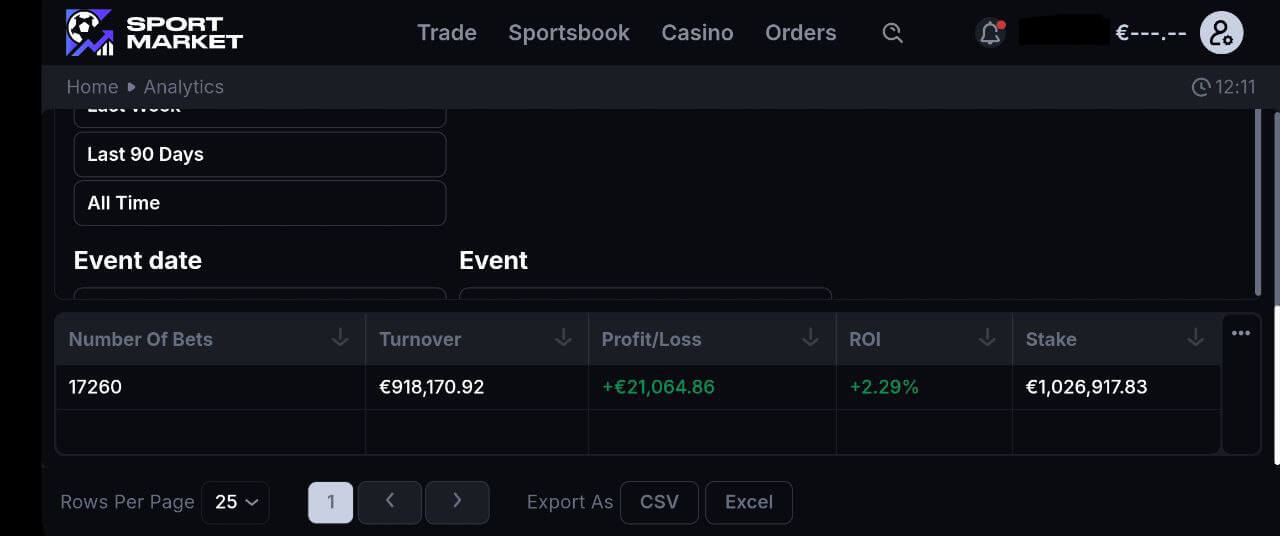
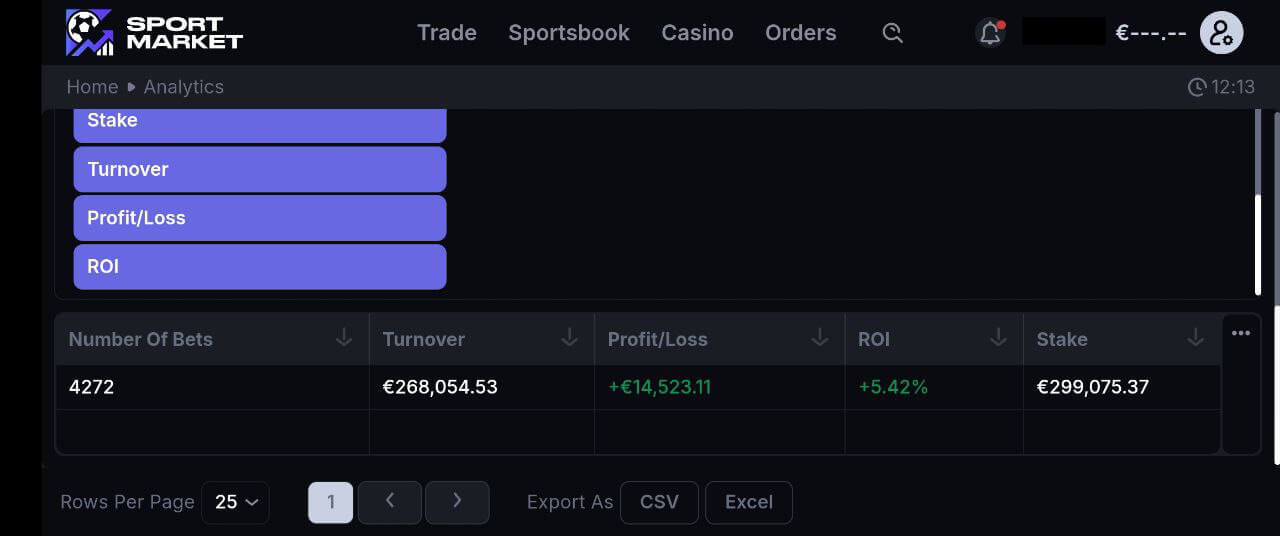
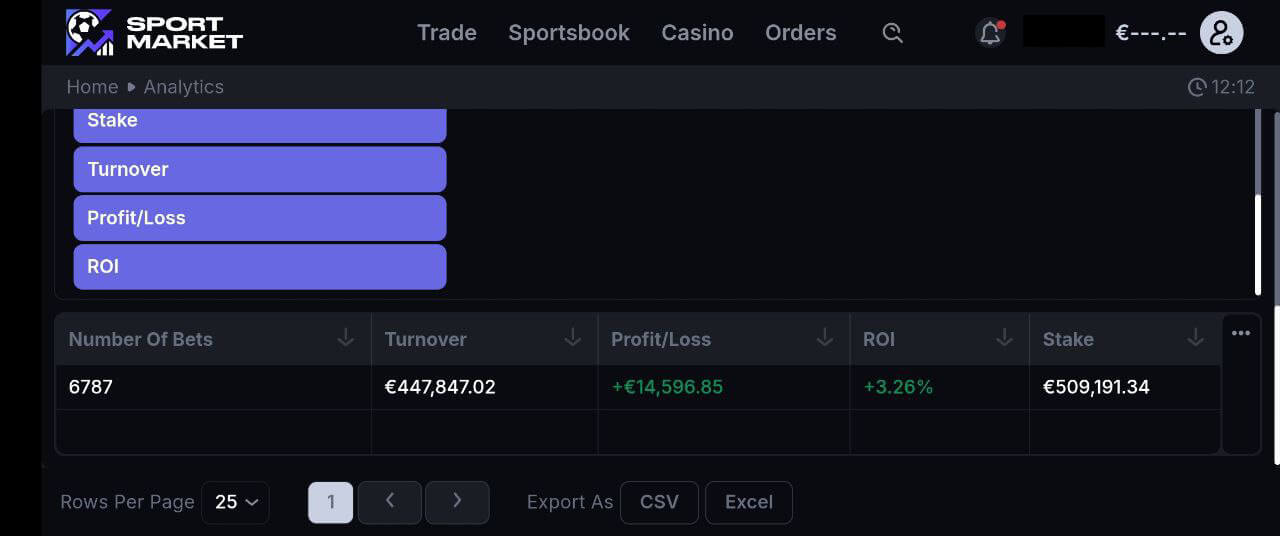
Screenshots of payments:
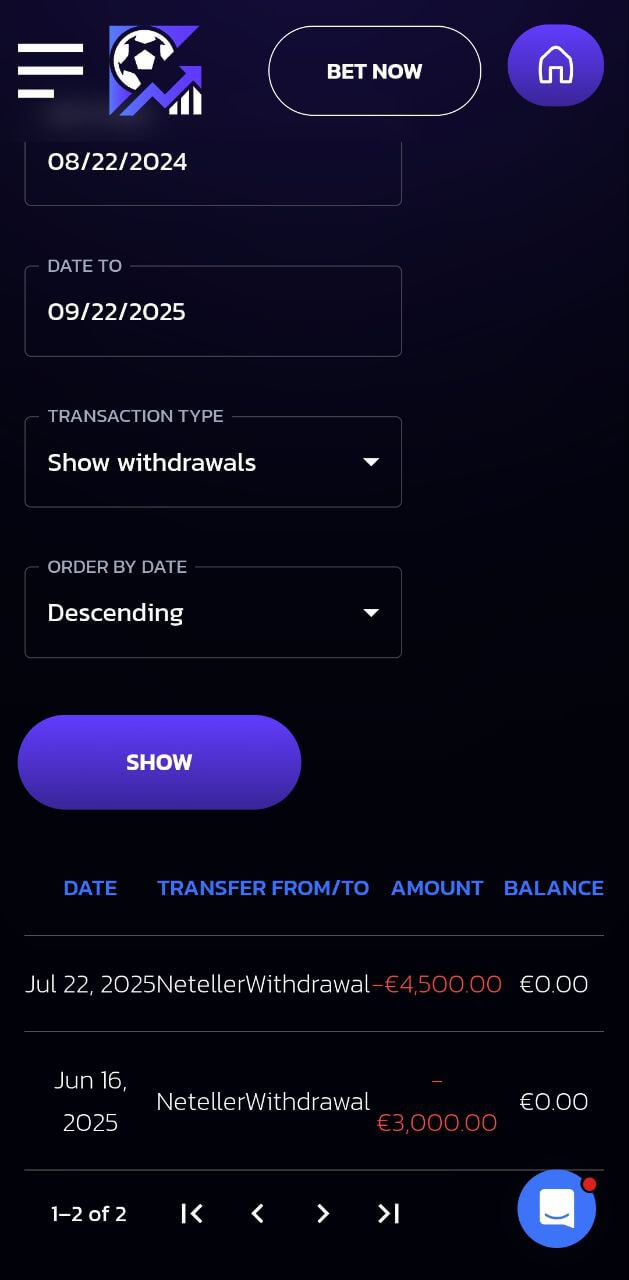
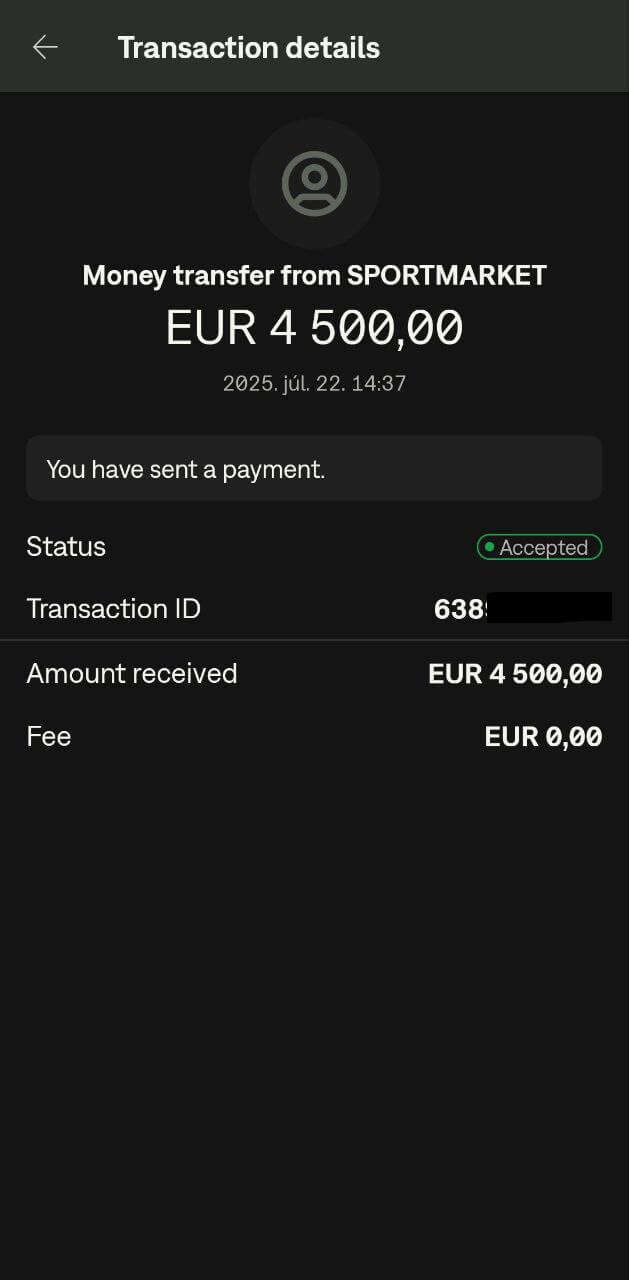
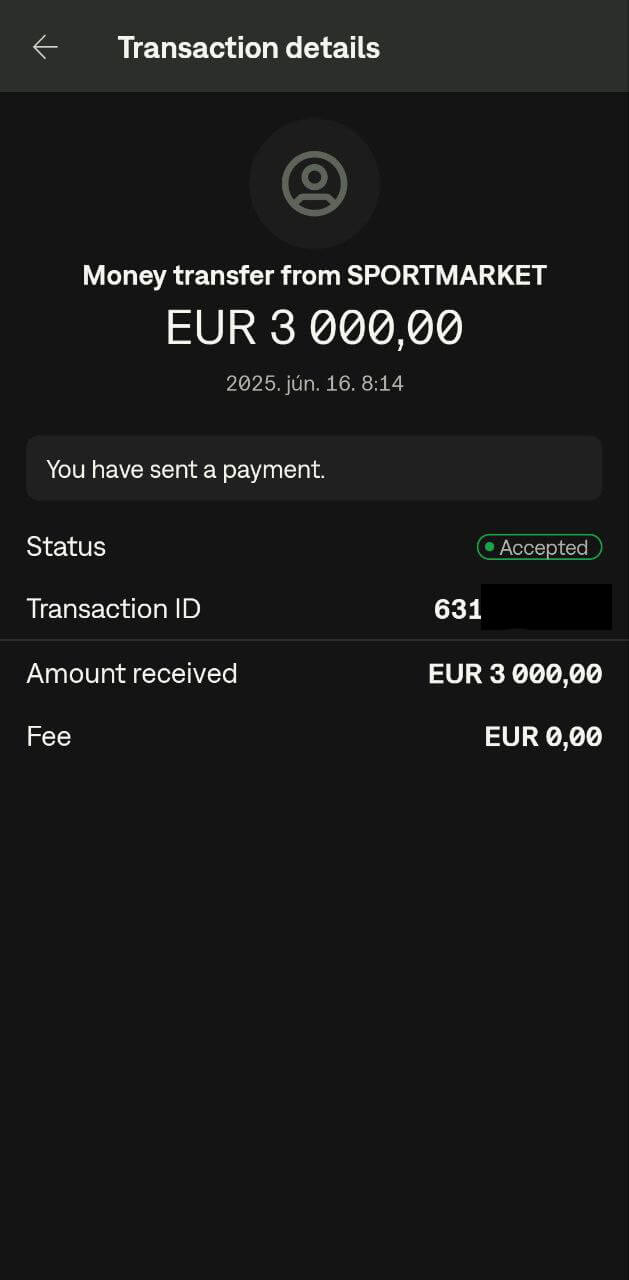
We also called ChatGPT to see if the statistics you see here are good for Asian betting shops. (Obviously, if we were to achieve a sustained ROI below 3% at soft bookmakers, it wouldn't be too strong, but you can read above that it's much easier to be profitable at TippmixPro, Bet365 and other soft bureaus.)
(Question to artificial intelligence) "How good is the result you see here in Asian markets?"
ChatGPT's answer:
Very good question, let's look with a professional eye at the result you brought from the Sportmarket statistics.
Data from the screenshot
- Number of bets: 17 260
- Turnover: €918 170,92
- Profit/Loss: +€21 064,86
- ROI (Return on Investment): +2,29%
- Stake total: €1 026 917,83
Valuation in the context of Asian (sharp) markets
Positive ROI in a sharp environment:
In the Pinnacle/PS3838 and similar sharp markets, the margin is very low (around 2-2.5%). This means that if you don't have an edge, you should be looking at a long term ROI of around -2%. The fact that you are returning +2,29% from more than 17,000 bets shows that you have a real, sustainable edge.
Sample size:
17 thousand bindings is already a statistically strong sample. We're not talking about a few hundred bets that could still be counted as variance. Based on this, the result is reliable, not a random outlier.
Profit rate:
A profit of more than 21 thousand euros on a turnover of 918 thousand euros is entirely fair. For professionals, the ROI of % is more important than the absolute profit because it shows the long-term viability of the method.
International comparison:
Arbitrageurs: usually around 0.5-1.5% ROI, but in huge volumes.
Value bettors: if they deliver a sustainable ROI of 1.5-3%, that's outstanding.
Modeling syndicates: 2-4% ROI is typical for the best systems.
In comparison, +2,29% is a very good result and positions me among the top value players.
Conclusion: Based on the screenshot, your result is very good in the sharp/Asian markets. This number proves not only that you beat the broker's aggregate odds, but also that your method is sustainable and profitable in the long run.
5) How can we make money on brokerage?
We do not have a universal answer to this either. More precisely, we can tell you, we can summarise how we have done it so far, but we need to know that we have to constantly measure our performance and frequently change our betting structure. What worked well six months ago may not work well now, so we have to keep trying, keep striving for the best results, and then, say, over a year, we will have an ROI indicator that shows how successful we have been.
Small addition: ROI (Return on Investment)
Calculation: profit ÷ total bets placed × 100%.
Example: if you bet 1 000 000 HUF in total and made a profit of 20 000 HUF, the ROI = 20 000 ÷ 1 000 000 = 2%.
I am sure there are many people who do not sympathise with us, or who simply want to rely on their own decisions, and are reading this article to start down this path. We would like to help them too, even though we do not recommend that they go it alone. Just to get your balance to at least around 0%, so that you don't lose money in the long run, well, you need at least several years of active attention / understanding / trial and error, almost "superhuman" perseverance and dedication. But if these basics are taken care of, it will be easier for you:
- It must be received in large volumes. To be successful at brokerage and have a good chance of working off a major fluctuation while making a substantial profit, you need to place at least 500-900 bets a month. ... In the Asian markets, you can work with an incredibly low edge rate; even if you make the best bets in the world, one bet does not contribute enough to your profits to make a meaningful profit with a low number of bets.
- The best bets to make are live bets, because the liquidity of the live market is much higher, meaning you can bet big and the odds are much more stable. With PRE (pre-match) betting, there is a risk that the odds will suddenly and dramatically drop in line with the bets you are placing or the bets others are placing at the same time/before you.
There are certain types of bets, such as under/over goal, where the odds are calculated less and less on the basis of the teams' performance as the match progresses, and more on the basis of the time remaining in the match. So you can get really good odds if you read the dynamics of the match well, because they tend to underestimate the goal difference in live games and price it at odds that are up to 25-30% higher than the actual probability. Obviously this doesn't mean that your odds will increase drastically, it "just" means that your average odds will be 25-30% higher, which if you combine that with your minimum odds, you will earn that much more money.
Obviously, we could write 20-30 more points, but this article is primarily for our followers/customers. ... if someone decides not to use our service in the end, but to start on their own, and heeds these tips, they have a better chance of starting than those who do not have this information.
6) Our betting robot will soon be ready for use. What exactly will it do?
This year we have invested a lot of resources - mainly material - to get off TippmixPro betting as soon as possible, as we see that it is getting worse and worse to tolerate winning bets and harder and harder to make money there. As we wrote above, in order to be successful on a broker you have to bet a lot. Yes, but here comes the first problem: We can't expect our customers to place 600-900 bets a month manually, that's 20-30 bets a day. That's a lot, you'd have to be on the phone all the time.
The only solution was: 'Well, let's make a host robot. Although I did a degree in computer science and had (have) a website builder/web development business, it's such a complex and complicated system that my skills are woefully inadequate. So after initial attempts, it became clear: we needed to find a developer, preferably someone who had worked on a similar project before and understood the essence of value capture, not looking at us with "Chinese eyes" when we talked about it.
It took us several rounds of selection, but we finally found the perfect developer and started what I think was our biggest budget development to date. The biggest challenge in a project like this is that the robot has to be prepared/trained for every situation that exists. Quasi we need to get it to take the actions of a responsible adult human with an investor attitude in different situations. For example: what should you do if the odds are greatly reduced? Is it worth taking a bet or waiting and trying to make a live bet? If it's a plus handicap, you'll find it hard to place it live as time is against you, only if the other team blatantly dominates / scores a goal will the odds strengthen, but then the question is whether it's worth it? I've just described a simple plus handicap bet for you, and you see how many aspects there are to consider? Most of the time I, or you, don't even think about this because we act on reflex, but with a robot it's different: it has to be taught. You have to be trained on all the betting options for each sport, you have to be programmed for all the different practices, which is a huge job.
I don't even want to "complain" anymore :) , without sacrifice there is no result, as they say, the point is to have a central "brain" to store this information. This "brain" will run on our central server and will be closely connected to it by the customers who use our automated betting facility. For each customer, we will create a so-called virtual server (a remote computer) that will be his and his robot alone. His robot constantly receives instructions from our central "brain", i.e. when / for which match / what to place. It processes the incoming information immediately and places it at the stakes you specify (which you can then set in our interface + lots of other little things on top of that). When it's done receiving, it will send a notification to your phone whether it was able to receive it or not. If it couldn't catch it, it will put the tip in a separate list that it will try to place later, or you can manually intervene: say you can bet in another office, or you can override your robot's idea (a bit futuristic, I know) and bet in a different way, then just remove it from the list via your phone and that bet will be considered closed by your system. But the story doesn't stop there. As they used to say on WS teleshop, "...and that's not all!!!" - because individual statistics are also kept on the bets placed, so you'll see accurate and up-to-date information on how your investment is performing on your web interface. Obviously, if you manually place a bet in, say, another office, it will only be included in the statistics if you upload it, but it's not a lot of work overall.
So this is roughly how our soon-to-be-published host robot should work.
There is also a very important development that is closely linked to the robot, but also stands on its own: Our goal is to have almost all of our bets come from the broker. Our current operation consists of either detecting which outcomes are overpriced based on so-called "odds checking", or we subscribe to external providers from which we receive tips that have value. The problem with this is that on the one hand, it's horrendously expensive (between €1,500 and €2,000 a month) and on the other hand, only a fraction of the bets can be placed via brokers. So instead of using external databases / sources, we would like to build our own database and work from it.
Our robot will continuously monitor and analyse live broker bets (on a wide range of sports) and select the best value outcomes on its own. It will then pass this on to our customers' "robots", who will copy it like "busy ants". And for those who don't have such an automated subscription, they will obviously receive a photo of the exact bet, but as we are talking about 600-900 bets a month, manual betting will not be the most convenient option.
We can't give you an exact price yet, but it will be around €100, which includes automation, so you get our robot + our own bets.
This is such a technical innovation that it should be reflected in the ROI percentage. So the ROI indicator on a brokerage fluctuating between 2.3% - 3% seen from the screenshots above, even with a lower estimate, would still manage to be between 4%-5%, which would really represent the peak of value betting in such Asian markets. If this is to translate into bets, I would put the monthly average profit at least in the range of 10-15 bets per month. Even with the current ROI of around 2.30 percent, for example, this year I've made about 10 bets a month in profit on brokerage. In addition, we were unable to place many bets that turned out to be winners, because the human reaction to bet in a hurry is simply not comparable to that of a robot. In many cases, we are only 40-50 seconds away from making a bet, which is difficult for us to do on a human scale, but not for a robot.
7) What is the REQUIRED bet management for broker bets? What capital is required?
First and foremost: The volatility of broker bets is high. You should be prepared to lose up to 30-40 bets at any time, which will be recovered through continuous and targeted betting. So let's say you start with £2M, your total goes up to £2.3M, then there's a downward trend, it goes down to say £1.4M, then it creeps back up to £2.3M and beyond. And all this can happen in 2 or 2.5 weeks. So you have to be very responsible with your bets, if you bet too much, you won't be able to mentally tolerate that volatility and you will panic during a down period.
Of course, my example above was quite drastic. How much you actually lose in a down period depends on your bet. But I used such a strong contrast on purpose to make sure everyone chooses the right bet.
But what are the good bets? - It is difficult to give universal advice/guidance, but we can give you an estimate:
- Up to 3 million capital: 1%
- Between 3-10 million capital: 0,75%
- Over 10 million bankroll: 0,5%
- 20 bets there is always a bet recalculation per profit or loss.
This only applies to brokers.
If you follow these instructions (but the robot will also signal you, so the system will be watching), you won't have to take excessive risks and will be able to tolerate periods of losses.
Another very important piece of advice is that anyone who starts betting with a broker should try to think long term. Of course, if you have a good base and you can start with 5-6 million, you can make good money in the short term (say six months) and you can take profits, because there will always be working capital left over to generate profits.
But if you start with, say, 1.5 million forints, it is of course advisable to leave the winnings in - reinvest them - so that you can grow your stake faster and make as much profit as possible on a monthly basis.
So for our lower capital customers, we suggest that they take out a share of the profits that covers the subscription fee (roughly €100 per month) and leave the rest in. This is a short-term sacrifice, but in the long run you will be much better off, as you will make much more money per unit of time.
8) How to place a bet on the broker (manually) - Videos
Most of the bets are now being taken out of the broker, so our customers can already use the BetInAsia broker. To help you place your bets manually, we have created three YouTube videos that you should watch:
Long video - introducing the platform
Place a specific bet from your phone
Combined betting from mobile
Thank you for reading! Contact & source
Thank you very much for reading this very long article! If you have any comments, feel free to send them to us via our Telegram profile: https://t.me/fektessbeokosan
If anyone would like to copy from the article, please feel free to do so, but please make sure to clearly indicate our website as the source, as there is a lot of time/energy/learning/experience in such a post and the findings therein.

